
“What would you do if you knew you wouldn’t fail?”
It’s a question that’s guided Alpine’s Founder and CEO Graham Weaver for most of his life—and one that came up early in his conversation on Invest Like the Best with Patrick O’Shaughnessy. In an episode that blends personal history, business strategy, and hard-earned wisdom, Graham offers a behind-the-scenes look at what drives Alpine—and what it takes to build a private equity firm that’s anything but conventional.
Below are just some of the topics covered in their 90-minute conversation. Listen to the full episode wherever you listen to podcasts, or watch the full conversation on YouTube.
From Dorm Room to Deal-Making
Alpine didn’t start with a massive fund or an experienced leadership team. It started with Graham, a Stanford Graduate School of Business (GSB) student, running deals out of his dorm room on Alpine Road and maxing out credit cards to make it work. By the age of 25, he’d bought three companies and, by his own admission, “made every mistake in the book.”
“The first few deals ended up okay, but only because I learned that great companies are nothing without great management,” he tells Patrick in the episode.
“Great companies are nothing without great management.”
Those early missteps would eventually shape Alpine’s core PeopleFirst philosophy: that people—not just products or markets—are the key to exceptional performance.
A Firm to Jump Out of Bed For
When Graham and the founding partners set out to define Alpine’s long-term ambition, they asked a simple but bold question: “What goal will get us out of bed in the morning?”
“What goal will get us out of bed in the morning?”
The answer became Alpine’s first North Star: to be the top-performing private equity firm in the world. That objective drives every decision—from how long to hold a business to how Alpine structures its platform companies. It’s led the firm to innovative strategies and programs, like its well-known CEO-in-Training program.
Talent Is the Alpha
Unlike traditional private equity firms, Alpine built its investing strategy around people first. “We think the greatest alpha is created through talent,” Graham said.
“The greatest alpha is created through talent.”
That belief powers Alpine’s CEO-in-Training (CIT) program, which places emerging leaders at the helm of Alpine’s portfolio businesses. These operators come from all walks of life: military veterans, recent MBAs, and entrepreneurs at heart. They all share several defining leadership traits: grit, emotional intelligence, and a “bias for action.”
“It’s not analysis paralysis,” Graham said. “The best leaders try, fail, adjust, and try again.”
Alpine supports these leaders with an ecosystem of 30+ executive coaches, playbooks built from decades of experience, and a culture that prioritizes listening over telling—especially in the first 90 days.
It’s no surprise that Alpine’s CEO-in-Training program is now the #1 most-applied-to job at Stanford GSB, Harvard Business School (HBS), and Northwestern University’s Kellogg School of Management. But that interest wasn’t manufactured—it grew organically, fueled by word of mouth, real results, and a culture that champions growth over perfection.
Platform Building
Most platform companies at Alpine are built from the ground up with scale in mind. Alpine’s first investment is in its holding company team—starting with key leadership hires such as a CEO, CFO, head of M&A, and others. With that team in place, Alpine works on building the right infrastructure—ERP systems, business intelligence tools, leadership academies—often before the first add-on acquisition is made.
Graham compares the strategy to “planting oak trees.” Oak trees can take decades to grow, but offer shade for hundreds of years to come.
Measuring The Impact of PeopleFirst
Because of our PeopleFirst approach to business, we take employee engagement seriously and measure employee satisfaction before and after new acquisitions through Employee Net Promoter Scores (eNPS).
“70% of people dislike their job or they’re disengaged in their job right now,” Graham explains. “If we can flip that and have 70% of people feel really engaged, it’s not just that it’s good for business, but I think it makes a big difference in employees’ lives.”
“70% of people dislike their job.”
These are just some of the topics covered in the podcast episode. And it starts with the same question that launched Alpine: What would you do if you knew you wouldn’t fail?
For Graham Weaver, the answer was to build something that mattered—not just to investors, but to employees, operators, and the communities Alpine serves. This episode pulls back the curtain on that journey and offers a blueprint for others who want to do the same.
Watch the full conversation
For further details, review our Privacy Policy and Terms of Service .






